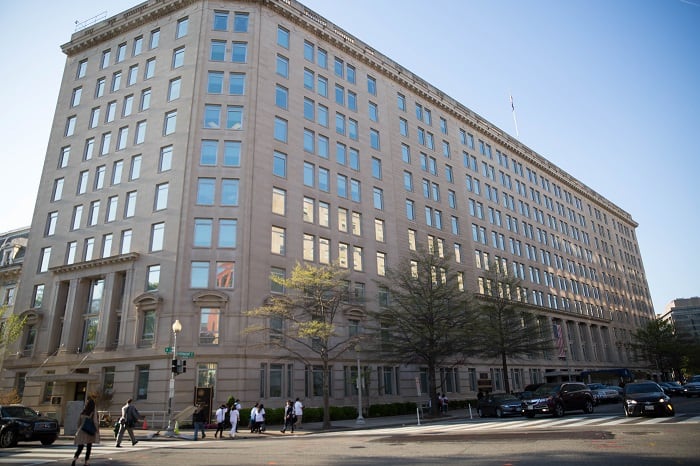WASHINGTON — Secretary of State Mike Pompeo said Wednesday that President Donald Trump has mischaracterized NATO allies as paying their bills or owing the United States.
In a highly anticipated hearing Wednesday about President Trump’s one-on-one meeting a week ago between Russian President Vladimir Putin in Helsinki, Finland, Senate Foreign Relations Committee Chairman Bob Corker, R-Tenn., challenged Pompeo.
“It would be a mischaracterization to say … they (NATO countries) are not paying bills to the United States?”
“That is correct,” Pompeo replied.
Corker criticized Trump for crossing a line at a recent NATO summit in Brussels beyond pressing members on burden sharing. “He went on to berate them, question the very premise of NATO and, in my opinion, used false information to turn public opinion of the United States against the alliance,” Corker said.
Trump has, in various ways, conflated members' goals of spending 2 percent of their gross domestic products on defenses. At a July 11 meeting with NATO’s secretary general, for example, Trump said, “many countries owe us a tremendous amount of money for many years back, where they’re delinquent, as far as I’m concerned, because the United States has had to pay for them."
"I'm going to tell NATO, ‘You gotta start paying your bills. The United States is not going to take care of everything,’” Trump said July 5 during a political rally ahead of Brussels.
Wednesday’s hearing was otherwise marked by combative exchanges — mostly with Democrats — over the wisdom of Trump’s private meeting Putin and whether Trump was tough enough with Putin on Russia’s annexation of Ukraine’s Crimea Peninsula or its meddling in U.S. elections. (North Korea talks and Iran were also hot topics.)
But a defiant Pompeo listed the administration’s many actions against Moscow as “proof” it is taking a hard line— including imposing sanctions, expelling Russian diplomats, closing a consulate and providing arms to Ukraine, where the military is fighting Russia-backed separatists. The appearance came an hour after as the U.S. made a formal declaration rejecting Russia’s annexation of Crimea, and Pompeo asserted Trump had taken “a staggering number of actions to protect our interests,” with regard to Moscow.
A key exchange came mid hearing when Corker took another run at Pompeo, pressing him to get candid about the president’s “damaging” remarks on Russian election interference and his questioning of NATO’s mutual defense agreement.
“To purposely cause the American people to misunderstand about the NATO contributions and to cause them to doubt NATO, and to really drive public opinion against NATO, that to me was purposeful,” Corker said, before heaping praise on Pompeo and Defense Secretary Jim Mattis.
“But it's the president's actions that create tremendous distrust in our nation among, among our allies. It's palpable. We meet and talk with them. Is there a strategy to this? What is it that causes the president to purposely, purposely create distrust in these institutions, and what we're doing?” Corker said.
Pompeo refuted the idea of a gulf within the administration and asserted Trump, who is definitely in charge, has put Putin, “in a very difficult place.”
“You somehow disconnect the administration’s activities from the president’s actions,” Pompeo told Corker. “They’re one and the same.”
Frustrated, Corker accused Pompeo of being evasive: “I notice that you are not responding to what I’m saying."
Pompeo suggested the president’s rhetoric has gotten results. U.S. allies, he said, are “behaving differently today” and “scrambling to figure out how to make sure that they are fully part of NATO.”
Earlier on, Sen. Jeanne Shaheen, D-N.H., and a co-lead of the Senate NATO Observer Group, pressed Pompeo on another side of the issue. Because the White House has been opaque on the summit, the Kremlin is claiming Helsinki yielded various agreements on Syria, catching the Pentagon off guard.
Shaheen asked Pompeo whether Trump had discussed with Putin military cooperation in Syria or a downgrade of the U.S. troop presence. Pompeo sidestepped repeatedly, responding that U.S. policy has not changed.
“That policy, with respect to deconfliction with Russia, has not changed,” Pompeo said. “I will defer to the Department of Defense for details around that. I can tell you that the policies that were in place with respect to the efforts to keep American pilots safe, keep American forces safe, the policy has not changed.”
The Russian Ministry of Defense earlier this week accused U.S. Gen. Joseph Votel, America’s top military commander for the Middle East, of discrediting Trump after Votel expressed hesitancy about working with Russia in Syria. Shaheen voiced concern the administration had not responded to defend Votel.
“It seems to me that our response to the Russian Ministry of Defense ought to be very strong to say they have nothing to say about what our generals are doing in Syria,” Shaheen said. “That's not their business.”
Sen. Tim Kaine, D-Va., questioned Pompeo over a Washington Post report that the chairman of the Joint Chiefs, Marine Gen. Joseph Dunford, hadn’t been formally briefed on the Helsinki summit, more than a week later.
“I’ve actually spoken with Chairman Dunford about it,” Pompeo replied. “I was with him in a series of meetings and we had a chance to have a conversation about it.”
Kaine also pressed Pompeo on whether the administration planned to follow a legal prohibition on military-to-military cooperation between the U.S. and Russia.
Pompeo said it was a question best directed to the Pentagon, adding, “Broadly, yes, this administration follows the law.”
Joe Gould was the senior Pentagon reporter for Defense News, covering the intersection of national security policy, politics and the defense industry. He had previously served as Congress reporter.




